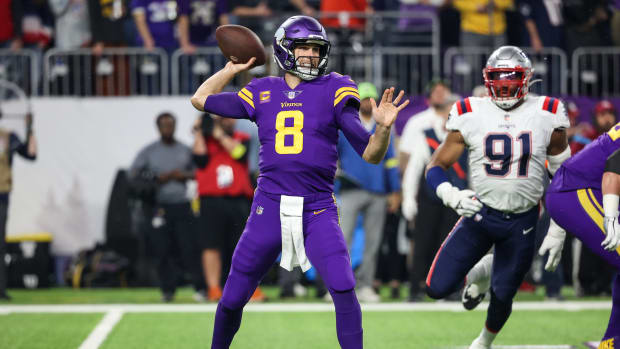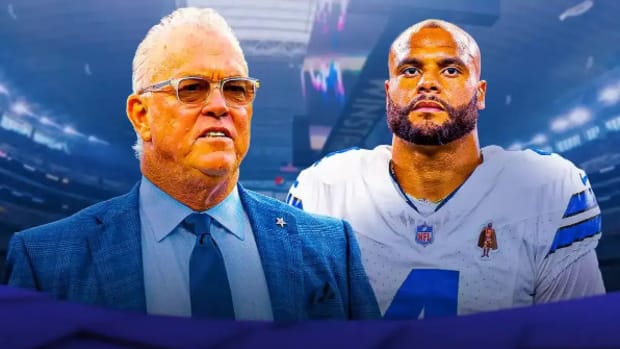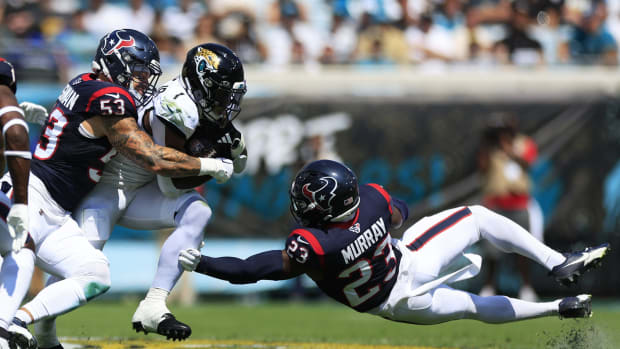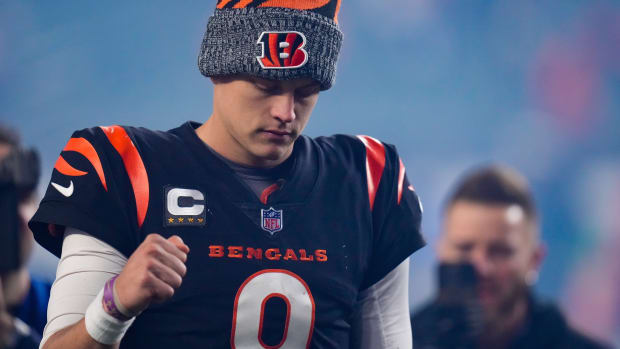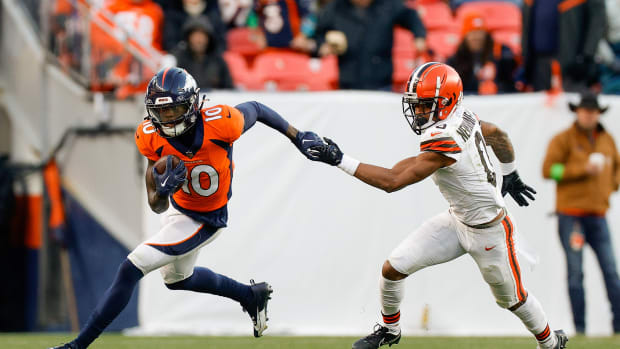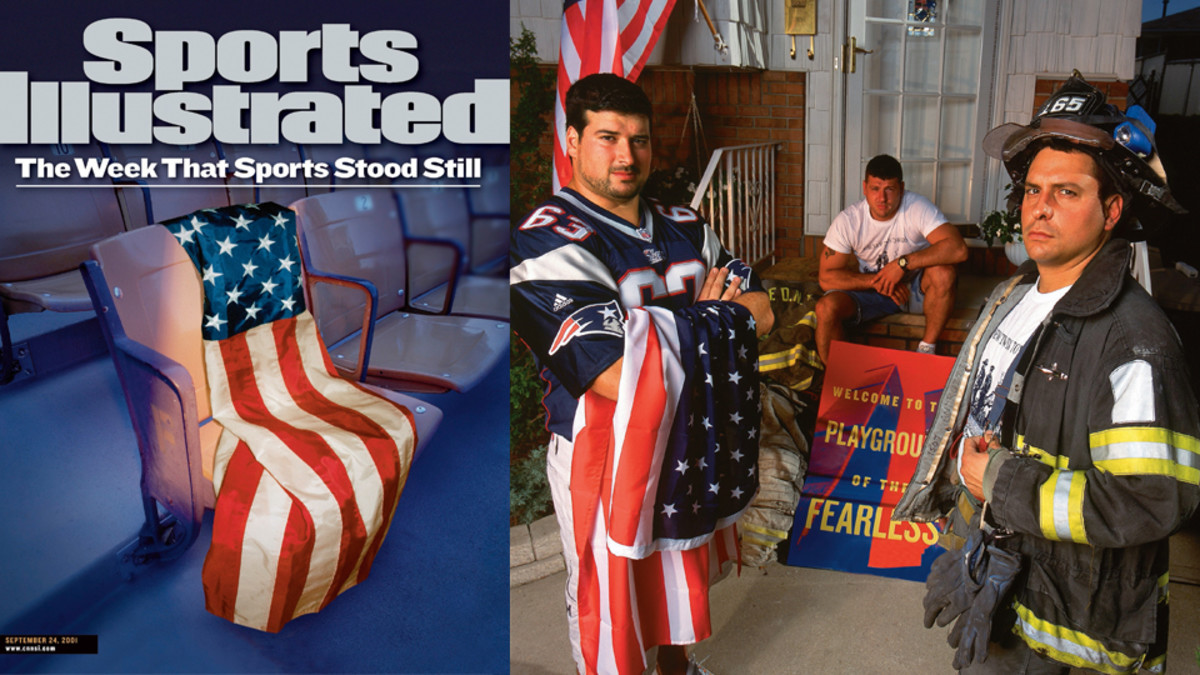
SI Vault: Patriots guard Joe Andruzzi reminded who the real heroes are
This story originally appeared in the Sept. 24, 2001 issue of SPORTS ILLUSTRATED. To subscribe to the magazine, click here.
The Andruzzis grew up the best kind of brothers, four boys wedged into two small bedrooms in their Staten Island home, loving and fighting, best friends and worst enemies. They spent long Saturday afternoons at the Little League field and Sundays at home, eating their mother's ritual macaroni and meatballs. They handed down paper routes and school clothes through four mini-generations. They were the sons of a New York City cop who sometimes worked three jobs at once to keep them all in parochial school, and their neighborhood was filled with the children of policemen and firefighters. Fathers were sometimes hurt or lost in the line of duty; that was part of life. Many sons would follow the same path.
Three of the Andruzzi boys became New York City firemen. Jimmy, 30, was first, graduating from the academy in October 1995. Billy, the oldest, at 32, first worked as a case manager for the New York City welfare department, but when he saw how much Jimmy loved his job, he joined the firefighting ranks in the summer of '99. The baby, Marc, 24, finished eight weeks of academy training in early September and is a "probie," beginning the probationary period that precedes graduation. "Their father was a cop, and now three sons are in the fire department," says their mother, Mary Ann, with a look of pride in her eyes. "My boys love to help people."
Joe, 26, would be the odd one. He kept growing long after his 200-pound brothers stopped, played football as an offensive lineman at Southern Connecticut State and clawed his way into the NFL as an undrafted free agent in 1997, making the roster of the Super Bowl champion Green Bay Packers. Despite three knee surgeries, he is the starting right guard for the New England Patriots, a 6'3", 315-pound contradiction of weekday calm and Sunday mayhem. "If I didn't play football, I would be teaching special education," says Joe. "I'm the black sheep, I guess. I wouldn't be a firefighter."
SI Vault Podcast: Tim Layden on the Andruzzi brothers, 9/11 anniversary
Still, he admires his brothers as much as they do him. "What's important is that my brothers are happy in what they do, and I know they are," says Joe. "A lot of people hate their jobs. I know my brothers are excited when they go to work. I'm excited when I get up on Sunday morning and know I've got a game to play. And I know they're excited when they go into a building to put out a fire." Nonetheless, he fights guilt over the opulence made possible by his profession. "I see them driving old cars, scrounging for second jobs," says Joe of his siblings. "The wage difference, it doesn't feel right for what they do."
Joe was in a dentist's chair on the morning of Tuesday, Sept. 11, when he heard a radio report of a fire at the World Trade Center. He rushed back to his house in North Attleboro, Mass., with his wife, Jen, and their children, Hunter, 3, and Breanna, 17 months, and they watched coverage of the attacks. Both towers were still standing but soon would fall. Joe knew that Jimmy was stationed in lower Manhattan (Engine 5, on East 14th Street). "I was thinking Jimmy could be in the middle of all that," says Joe. "I knew he had to be close. My heart was in my throat." Five hours passed before Joe learned that his brothers were all safe and that Jimmy had, indeed, been terrifyingly close to death.
"I see them driving old cars, scrounging for second jobs," says Joe of his siblings. "The wage difference, it doesn't feel right for what they do."
On the day after the disaster, Joe sleepwalked through meetings and practice in preparation for a game at Carolina that he hoped would not take place. "I was there, but not really there," he says. When the NFL announced the next day that its games were canceled, Joe drove to Staten Island. Late last Friday afternoon he was sitting in the living room of his parents' modest split-level house when Jimmy walked through the door and stopped at the entrance to the room. He raised his right hand and held his thumb and index finger less than an inch apart, wordlessly demonstrating the margin of his survival as his lip trembled and his eyes watered. Both men began to cry, and they embraced in the center of the room, sobbing for longer than either could ever remember.
On the morning of the attack, Jimmy was scheduled to work a nine-to-six shift, but firefighters all know that means showing up at eight. Just after 8:30 Jimmy and his squad were called to a smoky apartment on East 19th Street. Food left on a stove. They put out the fire and, as they climbed back onto the truck, heard a jet screaming overheard. Awfully low, they said to one another. Seconds later, the engine radio sounded. Engine 10, Ladder 10, a plane has hit Tower 1 of the World Trade Center. Engine 10 is in the shadow of the twin towers; firefighters from that company saw the first plane hit. Engine 5, fresh from the kitchen fire, was not far away. Within minutes the two companies were at the base of Tower 1, the first building that was struck.
Five days later Jimmy Andruzzi sat on a couch in his parents' living room, unshaven, wearing denim shorts and a white T-shirt. His brothers, Joe and Billy, sat nearby. Their father, Bill, 13 years retired from the police force, was on his way home from his sales job. Their mother was in the kitchen, making the Sunday macaroni and meatballs, seeking blessed routine even as a newspaper lay open on a table showing pictures of dozens of the missing, many of them friends of the Andruzzis.

New England Patriots guard Joe Andruzzi (No. 63) in action, blocking for QB Drew Bledsoe. Andruzzi feels guilty that he makes a far bigger salary than his brothers do.
Mark Duncan/AP
In a soft voice Jimmy described the events of Sept. 11.
"We're on the rig, and we look up and see the first tower burning, and my buddy, Derek Brogan, says to me, "We're going to the biggest disaster in the history of New York City." Once we're there, we're thinking about the protocol for a high-rise: command post in the lobby, another command post three floors below the fire. They told us the bottom of the fire was on the 79th floor. We're in the lobby when we hear another huge explosion. I figured out later that was the second plane hitting. I'm thinking, When we practice terrorist scenarios, they always tell us, "First responders will be casualties." The building is shaking, and nobody wants to go up now. They tell us, "Engine 5, go with Engine 10 to 79. Put that fire out." So we go up the stairs, me and Derek and Manny DelValle and Gerard Gorman and Eddie Mecner and Lieutenant Bob Bohak. That's what we do. We put out fires.
People are coming down the stairs. They're saying, "You guys are so brave, thank you, thank you." The stairwell is narrow--one line going up, another line going down. At the ninth floor Derek's getting chest pains. The lieutenant tells him to stop, but he keeps going. We're carrying 160 pounds of equipment, and it's hot. We get to the 23rd floor, and Derek is worse. The lieutenant radios for oxygen and tells the cops who bring up the oxygen to bring Derek back down. We start up again, maybe four more floors before we hear the biggest, loudest, most intense sound I've ever heard in my life. I didn't know at the time, but that was Tower 2 coming down. We thought it was our building coming down or a huge bomb. I figured I was dead right there. That's it.
"My brothers, they're blood," says Jimmy. "But the guys at the station house, they're my brothers too."
Lieutenant Bohak says, "Drop your hoses and get out! Right now! Out!" We start running down the stairs, and it's all black smoke. [Here Jimmy begins to sob loudly.] We're leaving all those firemen behind, and they're still going up. All those guys, those guys, going up, but we had to leave. Those poor guys.... [He pauses to compose himself.] We get to the fourth floor, and the door out of the stairwell to the lobby is locked. I feel this rumble, like thunder, and the walls start cracking and the beams are bending. Some guy, not a firefighter--God bless him, he was an angel--points out another door, and we got through that into the lobby. I ran out into the street and kept going, and the whole building came down, maybe 45 seconds behind me. All those firemen got killed, and I'm alive because Derek got chest pains and because my lieutenant told us to get out and that guy was on the fourth floor. [Long pause as he begins crying again.] It's not supposed to happen. Terrorists aren't supposed to fly jet planes into a building full of innocent people, and the World Trade Center isn't supposed to fall down. It's just not supposed to happen."
Firefighters have two families: one at home, one at the station house. "My brothers, they're blood," says Jimmy. "But the guys in the station house, they're my brothers too. Everybody knows everything about everybody else. You know who's got a new girlfriend, you know whose kids are sick. The guys with seniority, they get all the respect. The probies, they get their balls broken a lot. Thin skin doesn't play in the station house."
When Jimmy exited onto the street that Tuesday morning, he found that among his group from the stairwell, only DelValle was missing. Five days later he was still missing, along with Engine 5 lieutenant Paul Mitchell, who was off duty at the time of the crash but rushed to the site to help. They were two of the more than 300 New York City firefighters lost in the disaster, equal to more than a third of all previous casualties in the department's history. "Probably 100 of them were friends of mine," says Jimmy, who has worked at four station houses in his six-plus years with the department. "That's true of a lot of guys."

Jimmy barely escaped the collapsing tower, but his Engine 5 friend Manny Del Valle (center) was still missing as of Monday.
Courtesy of the Andruzzi family
At the core of this immeasurable disaster, the missing firefighters were at once heroes and victims, symbols of bravery and tragedy. It will be years before their ranks fully recover the experience and skill that was lost. Two days after the towers fell, Jimmy joined the thousands of firemen and other volunteers searching through the rubble for survivors and bodies. Standing atop a pile of twisted steel and compacted concrete, he felt another rumble, similar to what he had felt 48 hours earlier. He ran from the pile in terror and promised not to return soon.
His brothers Billy and Marc have done multiple shifts on what rescue and recovery workers have come to call "the mountain," their name for the pile of rubble that had been the tallest buildings in the city. "I hate to say that it's hard to appreciate what it's like down there," said Billy on Sunday, "but television does not do justice to how terrible it is."
The previous evening he had held a fellow firefighter's ankles as the man reached deep into the wreckage and scooped intestines out of a detached torso for DNA identification. In another place he picked up a single tooth. "By the end of my shift down there, I smelled like death," he said, and then he too began to cry.
On a cool, crystal-clear Sunday morning, Joe went with Jimmy to the Engine 5 station house, a three-story building that is one of the oldest firehouses in the city. He found tough men, scarred but battling for their sanity. "There were guys there who said they'd been crying for three days and it was time to stop," Joe said later. They were also worried about Jimmy, who had taken things harder than most. "They said he's not back yet," said Joe. "They said he needs more time. I hope it helps him to talk about it."
Joe sat on the steps of his mom and dad's home. A soft breeze ruffled the American flag on the front of the house. Inside, the table was set for dinner. Soon Joe would return to Massachusetts to begin preparing for this Sunday's game against the New York Jets in Foxboro. Football business. "Regular game week," said Joe.
Normalcy beckons, but reaching it will take longest for those survivors who were closest to the flame.
Anyone wishing to make a donation to help the families of the missing firefighters may do so by writing to this address: Uniformed Firefighters' Association 204 East 23rd Street New York, N.Y. 10010 Attn: UFA Widows and Children's Fund
































